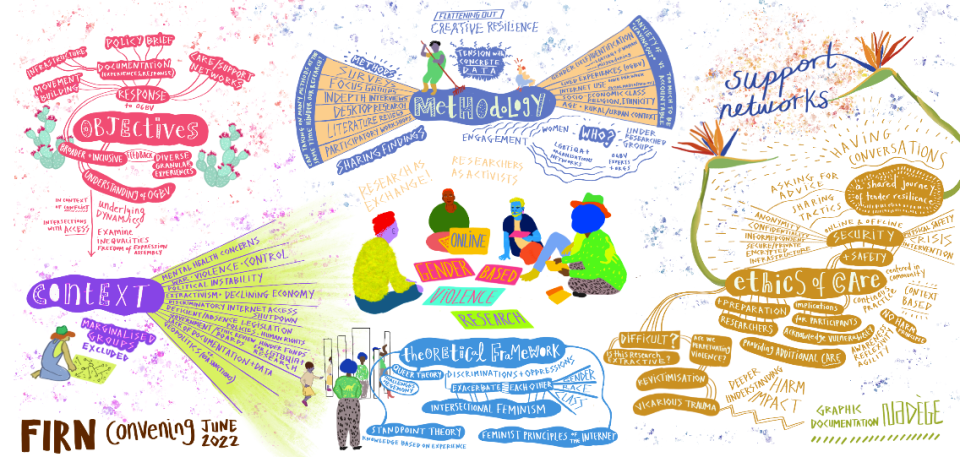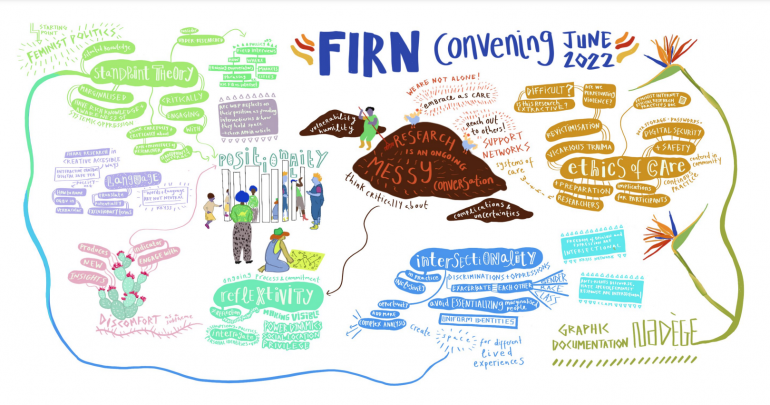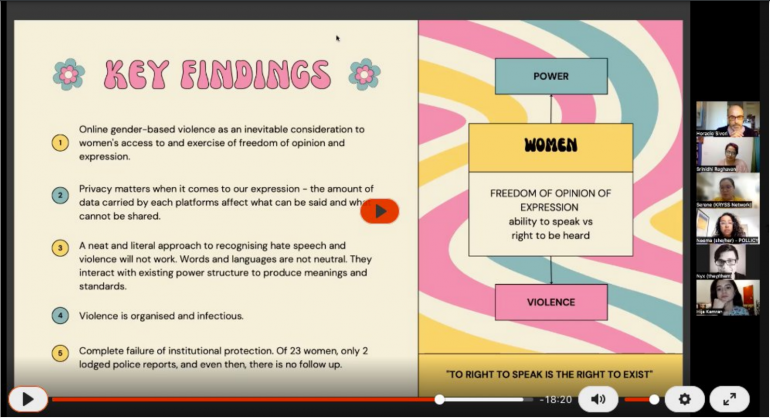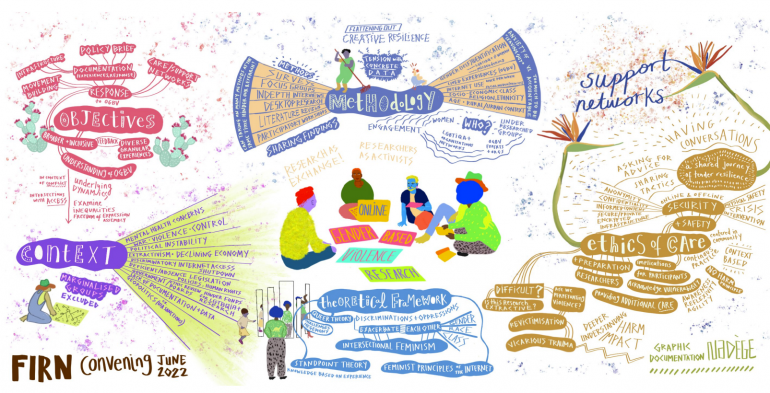
Feminist Internet Research Network. Illustration by Nadege
In June 2022, we came together to organise the Feminist Internet Research Network (FIRN) convening. These convenings remain a rich place of conversation for the network to deepen our engagement around feminist internet research across regions, build connections and expand our learnings as a community. This year the convening took place online on June 28 and June 29, 2022. Over the two days, FIRN partners had an opportunity to reflect on their research findings, creating ethics of care in line with our principles and the questions emerging from the process of research. With four new partners joining the network and their work in the coming months focusses on online gender based violence, we tried to explore, expand and deepen our understandings on the theme.

Partners who participated in the FIRN convening.
We also continue to work with these partners,

In the past year, at FIRN we have been able to also take a step back to understand the work within the network and make new connections with regards to feminist internet research on the whole. As part of this, Dr. Nyx Mc Lean worked on a Meta Research Project. This meta research project culminated in a paper that looks at the eight FIRN research projects embarked on over the past few years. On day 1 of the convening, we took the opportunity to examine our learnings from the meta research project and reflect on it from various entry points.
This created a space for dialogue to understand the complexities of doing internet research, the frameworks we use within this, the research methodological processes and the ethical practices. Dr Nyx took us through the findings of the meta research project which laid out the different ways in which feminist internet research can be done. The project presentation was a way for the FIRN community to be rooted in the values, frameworks and principles that ground our research. Through the presentation we explored the four pillars that were informing our work on feminist internet research. They were: standpoint theory, intersectionality, reflexivity and feminist ethics of care.

Feminist Internet Research Network. Illustration by Nadege.
The conversation that followed was a reminder that all feminist work must not just acknowledge power dynamics but analyze and challenge it as well. Especially in the context of the researcher and their intersecting identities and how these interact with the research along with the findings of it. We also reflected on what counts as feminist ethics of care – from care in shaping the questions and the research itself to being aware of the impact this research can have on participants of the research as well as those conducting the research. What stood out is that what counts as feminist ethics of care was the ways in which digital safety, privacy and security also need to be catered to from the beginning.

Screenshot from KRYSS network presentation about their research.
This conversation was followed by a short panel on gender based violence based on work conducted by three FIRN partners in Brazil, Malaysia and in five countries in sub-Saharan Africa, namely Ethiopia, Kenya, Uganda, Senegal and South Africa. On the panel were Horacio Sivori from Latin American Centre on Sexuality and Human Rights (CLAM); Serene Lim from KRYSS Network; and Neema Iyer from Pollicy. Each of the presentations by the panellists spoke about their specific research and their findings from it.
Responding to the violence
The presentations demonstrated the varied ways in which women and queer people experience violence online but also the many responses by those experiencing violence. Sometimes by choosing to leave the space where violence occurs, sometimes by staying and choosing what they share, and other times just blocking and continuing to post.

Screenshot of the interactive Chatbot built by Pollicy
It also drew our attention to the fact that though research reports may be in English, while the interviews and conversations happen in many different languages. There is a need for specific care to be taken in how language around violence or even intersectionality can be translated into local languages while holding onto the nuance but also ensuring it is accessible to the ones participating in the research.
On Day 2, the four new partners from the African continent and MENA region presented the scope of their research, their thoughts and visions for the project. As their projects are in the initial stages, many of the conversations revolved around what we can reflect on, pay attention to and ensure in the months to come. Of these, two projects will focus on women’s experiences of online violence, how freedom of expressions factors into this in Democratic Republic of Congo and Sudan. One group will be focussing on the experiences of transgender, non-binary and gender diverse Africans, and the other will explore the experiences of online violence of LGBTQI+ individuals in Turkey.
Role of our identities during research

Feminist Internet Research Network. Illustration by Nadege.
Some of the researchers who will be focussing on transgender, non-binary and gender-diverse experiences of online gender-based violence addressed how sometimes bringing together the experiences of all marginalised genders – like cis women and trans women – can be unhelpful. This aspect brought forth a lot of discussion in the group on the advantages as well as limitations of bringing these very different groups with vastly different experiences together. It was important for us to assess our discomfort with this and respond in a way that affirms the participants of the research as well.
In gathering together for two days online, the FIRN community was able to focus on the process of research as much as the findings. In doing so, many of the researchers spoke about the reckoning that research is dynamic and messy and there is a need for us to make room for this messiness as an act of care for everyone involved.
- 1345 views






Add new comment